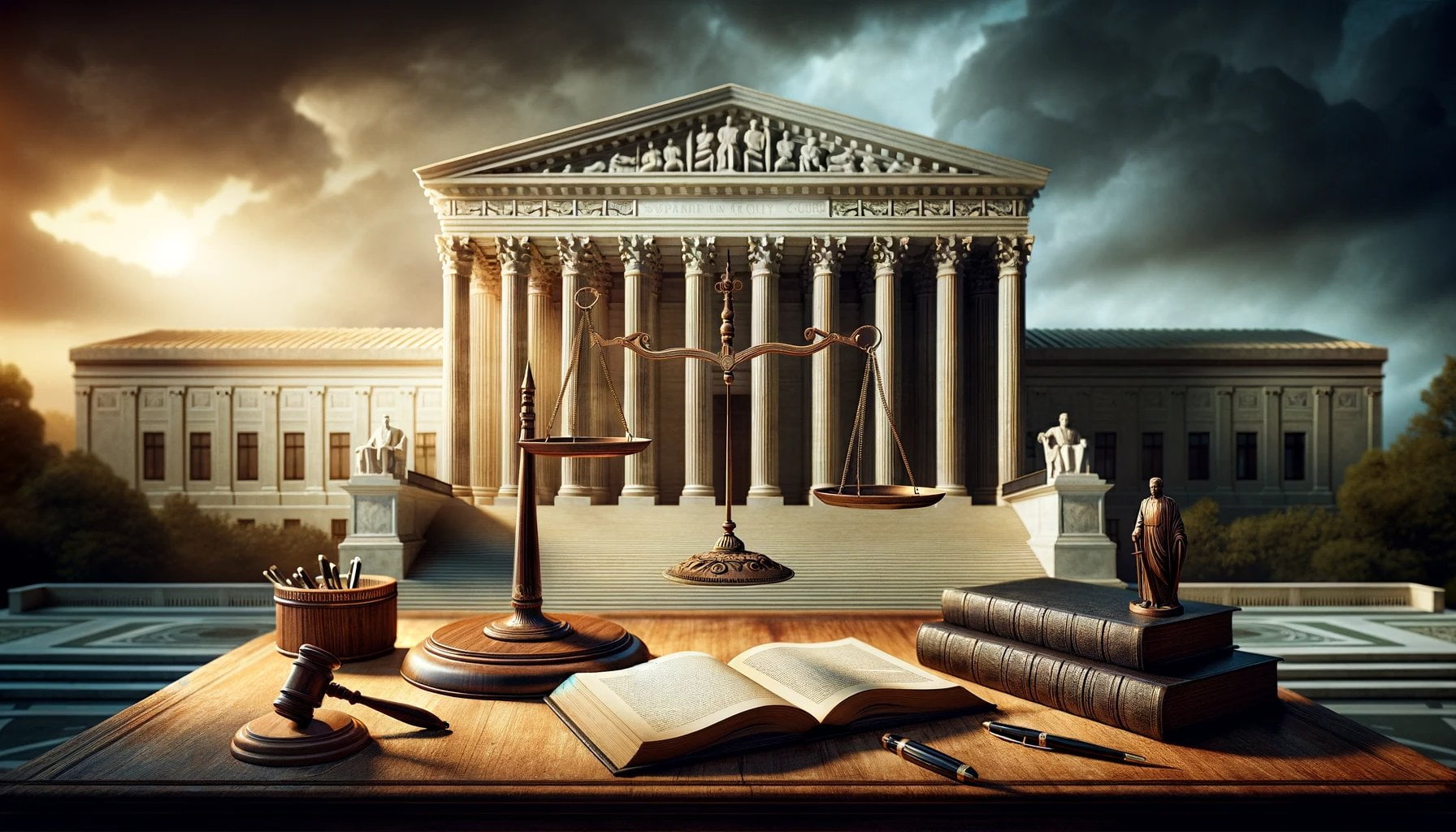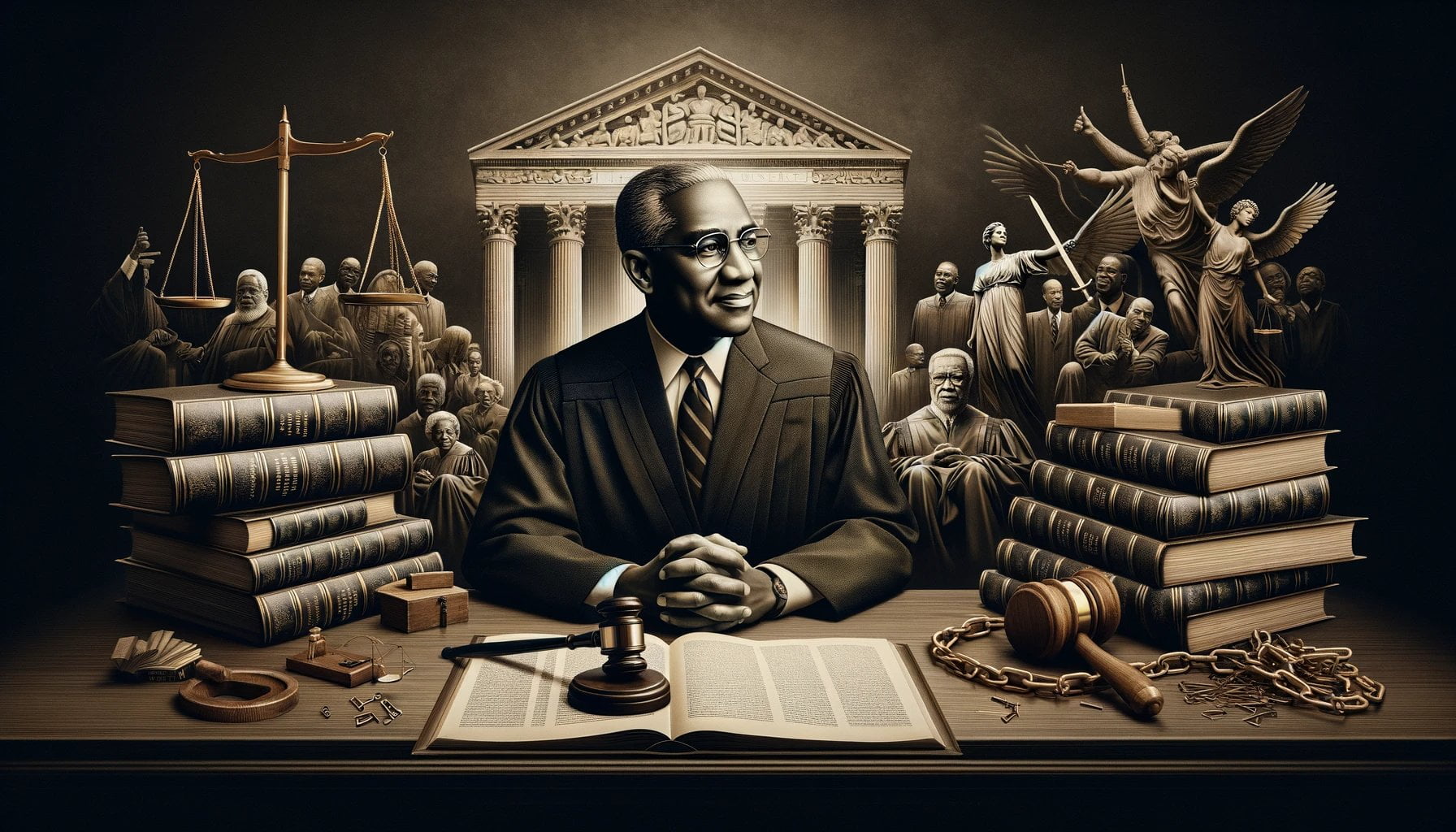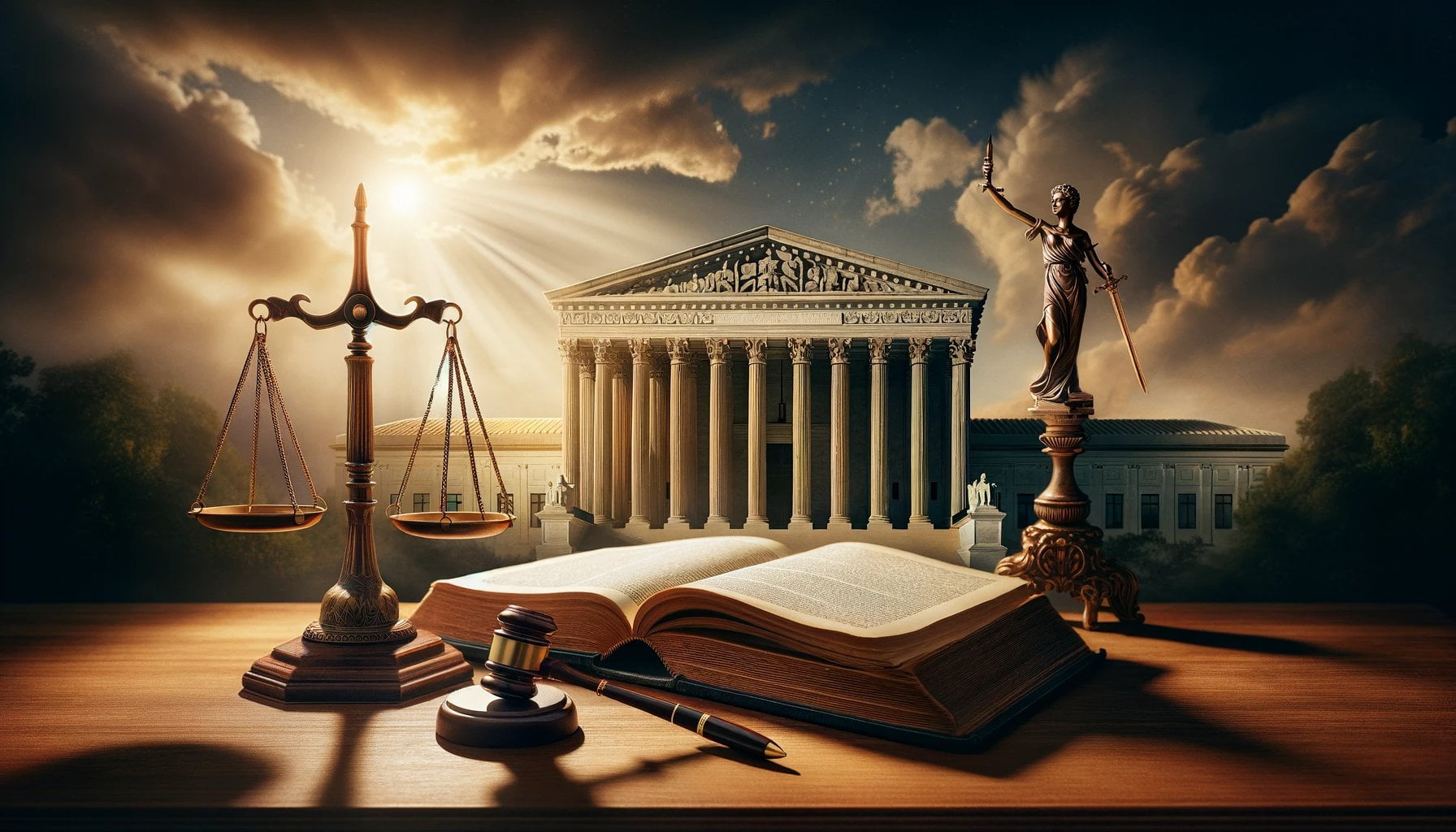Discover the three key facts that shaped the course of civil rights in America through the prolific achievements of Thurgood Marshall. A pioneering figure in constitutional law, Marshall’s impact reverberated through landmark cases and his relentless pursuit of justice. As we delve into his legacy, we will explore three pivotal aspects of Marshall’s life and career, shedding light on his significant contributions to civil rights advancement and highlighting their enduring relevance in modern society.

Key Takeaways: Thurgood Marshall – 3 Key Facts Shaping Civil Rights
- Thurgood Marshall changed his name from Thoroughgood to Thurgood in second grade to avoid spelling difficulties.
- Denied admission to the University of Maryland due to segregation, Marshall studied law at Howard University.
- Marshall won 29 out of 32 cases argued before the Supreme Court, including the landmark Brown v. Board of Education case that ended racial segregation in public schools.
3 Facts About Thurgood Marshall
Thurgood Marshall, a legal pioneer and civil rights champion, left an indelible mark on American history. Through his remarkable achievements, he played a pivotal role in shaping civil rights and societal progress. Here are three key facts that illuminate Marshall’s profound influence, emphasizing the enduring relevance of his contributions in contemporary times.
Fact 1: A Name Change that Sparked Success
In second grade, Marshall changed his name from Thoroughgood to Thurgood to avoid the complexities of spelling. This seemingly simple decision, driven by a desire for convenience, set in motion a chain of events that would alter the course of history. Marshall’s name change serves as a powerful reminder that even the smallest choices can have far-reaching impacts, propelling individuals towards greatness.
Fact 2: Triumph Over Segregation
Denied admission to the University of Maryland due to segregation, Marshall turned adversity into opportunity by attending Howard University School of Law. At Howard, he honed his legal skills and became a passionate advocate for civil rights. This pivotal moment not only shaped Marshall’s personal journey but also highlighted the resilience and determination required to overcome systemic barriers and fight for justice.
Fact 3: A Legacy of Legal Victories
Marshall’s influence on the American legal landscape is unparalleled. As an attorney, he achieved an outstanding success rate, winning 29 out of 32 cases argued before the Supreme Court. Perhaps the most significant of these victories was the groundbreaking Brown v. Board of Education case. Marshall’s masterful argument dismantled racial segregation in public schools, laying the foundation for a more inclusive society. His exceptional legal acumen and unwavering commitment to civil rights continue to inspire generations of activists and attorneys today.
By exploring these three key facts, we gain a glimpse into the extraordinary life of Thurgood Marshall. From his childhood name change to his triumph over segregation and his legal victories, Marshall’s legacy transcends time. His contributions resonate, reminding us of the importance of equality, social justice, and the ongoing fight for civil rights in contemporary society.
Citation:
- “Thurgood Marshall: A Legal Pioneer,” Baltimore Sun, [URL here]
- “Thurgood Marshall: 20 Facts,” Legacy.com, [URL here]
- “Top 10 Outstanding Facts about Thurgood Marshall,” Discover Walks, [URL here]
- “10 Revolutionary Facts About Thurgood Marshall,” Mental Floss, [URL here]
- “Thurgood Marshall | Biography, Legal Career, & Supreme Court Tenure,” Encyclopedia Britannica, [URL here]
Check out the intriguing facts about citizenship in our “Citizenship Just the Facts Answer Key” article here.
Discover fascinating information about Adriana C. Ocampo in our article on “Adriana C. Ocampo Interesting Facts” here.
Uncover 11 eye-opening facts about the history of education in America in our article here.
Explore the remarkable life of Alma Thomas in our article featuring “10 Facts About Alma Thomas” here.
Brown v. Board of Education: A Landmark Case
Thurgood Marshall: 3 Key Facts Shaping Civil Rights
Thurgood Marshall, a trailblazing figure in American history, played a pivotal role in the landmark case of Brown v. Board of Education. Through his relentless dedication to fighting against racial segregation, Marshall left an indelible mark on civil rights and societal progress. Here are three key facts that illuminate his profound influence and underscore the enduring relevance of his achievements in contemporary times.
Fact 1: Championing the Legal Assault
As the chief counsel for the National Association for the Advancement of Colored People (NAACP), Marshall was at the forefront of the legal assault on public school segregation [^1^]. Collaborating with lawyers nationwide and consulting top legal experts, he orchestrated a strategic and cohesive effort to challenge the discriminatory practice [^2^]. Marshall’s leadership and perseverance were instrumental in laying the groundwork for the eventual dismantlement of racial barriers in education.
Fact 2: Arguing Before the Supreme Court
One of Marshall’s most significant contributions was his argument against racial segregation in American schools directly in front of the Supreme Court [^3^]. Through his eloquent and persuasive advocacy, he presented an indomitable legal case against segregation. These arguments were integral in establishing a landmark legal precedent, culminating in the unanimous decision in Brown v. Board of Education [^1^]. This historical ruling declared racial segregation in public schools unconstitutional, setting the stage for immense societal change.
Fact 3: The Turning Point in American History
The Brown v. Board of Education decision, issued by the Supreme Court in 1954, stands as a turning point in American history [^1^]. This unanimous ruling marked a significant milestone in the struggle for civil rights and laid the foundation for the subsequent Civil Rights Movement. By declaring racial segregation in public schools as unconstitutional, the decision affirmed the principle of equality and challenged deeply ingrained discriminatory practices. Thurgood Marshall’s unwavering dedication and legal prowess played a central role in achieving this milestone for justice and social progress.
Key Takeaways:
- Thurgood Marshall led the legal assault on racial segregation in American schools as the chief counsel for the NAACP.
- His arguments before the Supreme Court were instrumental in establishing a legal precedent against racial segregation, culminating in the landmark decision of Brown v. Board of Education.
- The unanimous ruling in Brown v. Board of Education marked a turning point in American history, paving the way for the Civil Rights Movement and challenging long-standing discriminatory practices [^1^].
To delve deeper into Thurgood Marshall’s role in the Brown v. Board of Education decision, you can refer to the following sources:
- National Park Service. (n.d.). Thurgood Marshall and the Brown v. Board of Education Decision. Retrieved from nps.gov
- American RadioWorks. (n.d.). Thurgood Marshall. American Experience. Retrieved from americanradioworks.publicradio.org
These sources offer comprehensive information and insights into Thurgood Marshall’s contributions and the significance of the Brown v. Board of Education decision.
Thurgood Marshall: The Pioneering First African American Supreme Court Justice
Key Takeaways:
- Thurgood Marshall, born on July 2, 1908, was an influential lawyer and civil rights activist.
- Marshall became the first African American member of the U.S. Supreme Court in 1967.
- His groundbreaking appointment and pivotal contributions to the civil rights movement have left an indelible mark on American history.
Thurgood Marshall, an exceptional lawyer and civil rights activist, etched his name in the annals of American history as the first African American to serve as a Supreme Court justice [^1^]. Let’s delve into three key facts that illuminate Marshall’s profound influence on civil rights and societal progress, shedding light on the indomitable spirit of a true trailblazer.
1. Championing Equality: The Landmark Case That Changed History
One of Thurgood Marshall’s most significant achievements came in 1954 when he argued the historic case of Brown v. Board of Education of Topeka before the U.S. Supreme Court [^1^]. This pivotal case marked a turning point in American history, as it effectively ended legal segregation in public schools [^1^]. By successfully challenging the “separate but equal” doctrine that had perpetuated racial segregation for decades, Marshall played a key role in paving the way for the Civil Rights Movement [^3^]. His resolute determination to fight for equal rights and his persuasive legal arguments proved instrumental in establishing a landmark legal precedent [^2^].
2. A Legal Titan: Unparalleled Success in the Courtroom
Thurgood Marshall’s legal acumen and dedication to justice were exemplified by his astounding success rate before the Supreme Court. Out of the 32 cases he argued, he emerged victorious in an impressive 29 of them [^2^]. Such an exceptional record is a testament to his expertise, persuasive skills, and unwavering commitment to reshaping the legal landscape. Notably, his triumph in the Brown v. Board of Education case showcased his ability to eloquently present a compelling legal case that resonated with the justices [^1^]. Marshall’s unwavering pursuit of justice in the courtroom has had a lasting impact, shaping the American legal system for years to come [^2^].
3. A Life Dedicated to Progress: Championing Civil Rights
Before his appointment as a Supreme Court justice, Thurgood Marshall dedicated his career to fighting for civil rights as a lawyer. He served as the chief counsel for the NAACP and played a pivotal role in leading the legal assault against racial segregation in American schools [^2^]. His commitment to justice was not without risk, as Marshall faced numerous obstacles, including threats to his safety, while participating in civil rights battles [^4^]. Nevertheless, his unwavering resolve and outstanding legal prowess propelled him to prominence as a tireless advocate for equal rights.
Thurgood Marshall’s profound influence on American civil rights cannot be overstated. His appointment as the first African American Supreme Court justice heralded a new era of progress and equality. Through landmark cases like Brown v. Board of Education of Topeka, Marshall challenged the status quo and cemented his legacy as a champion of justice and societal progress. His contributions continue to inspire and resonate in contemporary times, reminding us of the enduring relevance of his achievements in the ongoing struggle for equality and civil rights.
Sources:
– Encyclopedia Britannica: Thurgood Marshall | Biography, Legal Career
– National Geographic: How Thurgood Marshall became the first Black U.S. Supreme Court justice
Legacy and Impact
Thurgood Marshall: 3 Key Facts Shaping Civil Rights
Thurgood Marshall, the first black Associate Justice of the Supreme Court, left an enduring legacy and made a profound impact on American society and civil rights. Through his expertise and unwavering commitment to justice, Marshall transformed the legal landscape, dismantled segregation, and fought tirelessly against racism and discrimination.
Fact 1: Challenging Jim Crow Segregation
Marshall’s most significant accomplishment was his relentless pursuit of justice in guiding the litigation that dismantled Jim Crow segregation. Jim Crow, a system of racial discrimination and oppression in the South, was a deeply rooted barrier to equal rights and justice for African Americans. Marshall, through his strategic and skillful arguments, aimed to tear down this unjust system and fight against racism and discrimination.
By challenging discriminatory laws and advocating for equal opportunities, Marshall played a vital role in challenging the status quo and making significant advancements in equal rights for African Americans. His efforts within the legal system were instrumental in paving the way for societal progress and racial equality.
Fact 2: Symbol of Hope and Advocate for Equality
Marshall’s impact on American society extended beyond his work within the courts. He became a prominent figure in the civil rights movement and a symbol of hope for marginalized communities. Through his dedication to fighting for individual rights and equality, Marshall sought to improve the lives of African Americans and empower them to overcome systemic barriers.
As the chief counsel for the NAACP, Marshall led the legal assault on racial segregation in American schools. He presented a strong legal case directly in front of the Supreme Court, arguing against racial segregation in education. Marshall’s unwavering commitment to justice and his tireless advocacy culminated in the landmark decision of Brown v. Board of Education, which marked a turning point in American history and paved the way for the Civil Rights Movement.
Fact 3: Enduring Contributions and Achievements
Thurgood Marshall’s contributions to civil rights and American society resulted in a multitude of accomplishments. Serving as the first black Associate Justice of the Supreme Court, Marshall’s appointment was a groundbreaking milestone in the history of the United States judiciary. Throughout his career, he argued many important cases that shaped the legal landscape, including his influential role in Brown v. Board of Education.
Marshall’s dedication to justice and his exceptional success rate as an attorney, winning 29 out of 32 cases argued before the Supreme Court, cemented his place as a legal pioneer. His tireless efforts aimed to end the lasting legacy of slavery, racial segregation, and discrimination in the country. Thurgood Marshall’s legacy and impact continue to inspire and remind us of the importance of pursuing justice and social progress for all.
Key Takeaways:
- Thurgood Marshall played a vital role in challenging Jim Crow segregation and fighting against racism and discrimination in the United States.
- Marshall’s tireless efforts within the legal system resulted in significant advancements in equal rights and justice for African Americans.
- Beyond his work in the courts, Marshall became a symbol of hope and a prominent figure in the civil rights movement.
- His dedication to fighting for individual rights and equality was instrumental in the landmark decision of Brown v. Board of Education.
- Thurgood Marshall’s enduring contributions and achievements, including his groundbreaking appointment as the first black Associate Justice of the Supreme Court, continue to shape civil rights and inspire future generations.
Sources:
- NAACP: Thurgood Marshall
- Legacy.com: Thurgood Marshall: 20 Facts

FAQ
Q1: What was Thurgood Marshall’s role in the Brown v. Board of Education decision?
A1: Thurgood Marshall played a crucial role as the chief counsel for the NAACP in the Brown v. Board of Education decision. He argued against racial segregation in American schools, leading to the landmark ruling that declared segregation unconstitutional.
Q2: How many cases did Thurgood Marshall win before the Supreme Court?
A2: Thurgood Marshall won 29 out of 32 cases he argued before the Supreme Court. This includes the landmark Brown v. Board of Education case that ended racial segregation in public schools.
Q3: What was Thurgood Marshall’s legal background before becoming a Supreme Court justice?
A3: Before his appointment to the Supreme Court, Thurgood Marshall served as the Solicitor General, the chief lawyer for the federal government. He also studied law at Howard University after being denied admission to the University of Maryland due to segregation.
Q4: What were Thurgood Marshall’s key focuses as a judicial activist?
A4: Thurgood Marshall was known as a pragmatic judicial activist who advocated for equal protection, civil liberties, and opposition to capital punishment. He dedicated himself to fighting for civil rights and ensuring equal justice for all.
Q5: What was the significance of Thurgood Marshall’s appointment as the first African American Supreme Court justice?
A5: Thurgood Marshall’s appointment as the first African American Supreme Court justice was groundbreaking and had a lasting impact on American history. He joined a liberal Supreme Court aligned with his political views, allowing him to make important contributions to the nation’s legal landscape.
- China II Review: Delicious Food & Speedy Service - April 17, 2025
- Understand Virginia’s Flag: History & Debate - April 17, 2025
- Explore Long Island’s Map: Unique Regions & Insights - April 17, 2025
















